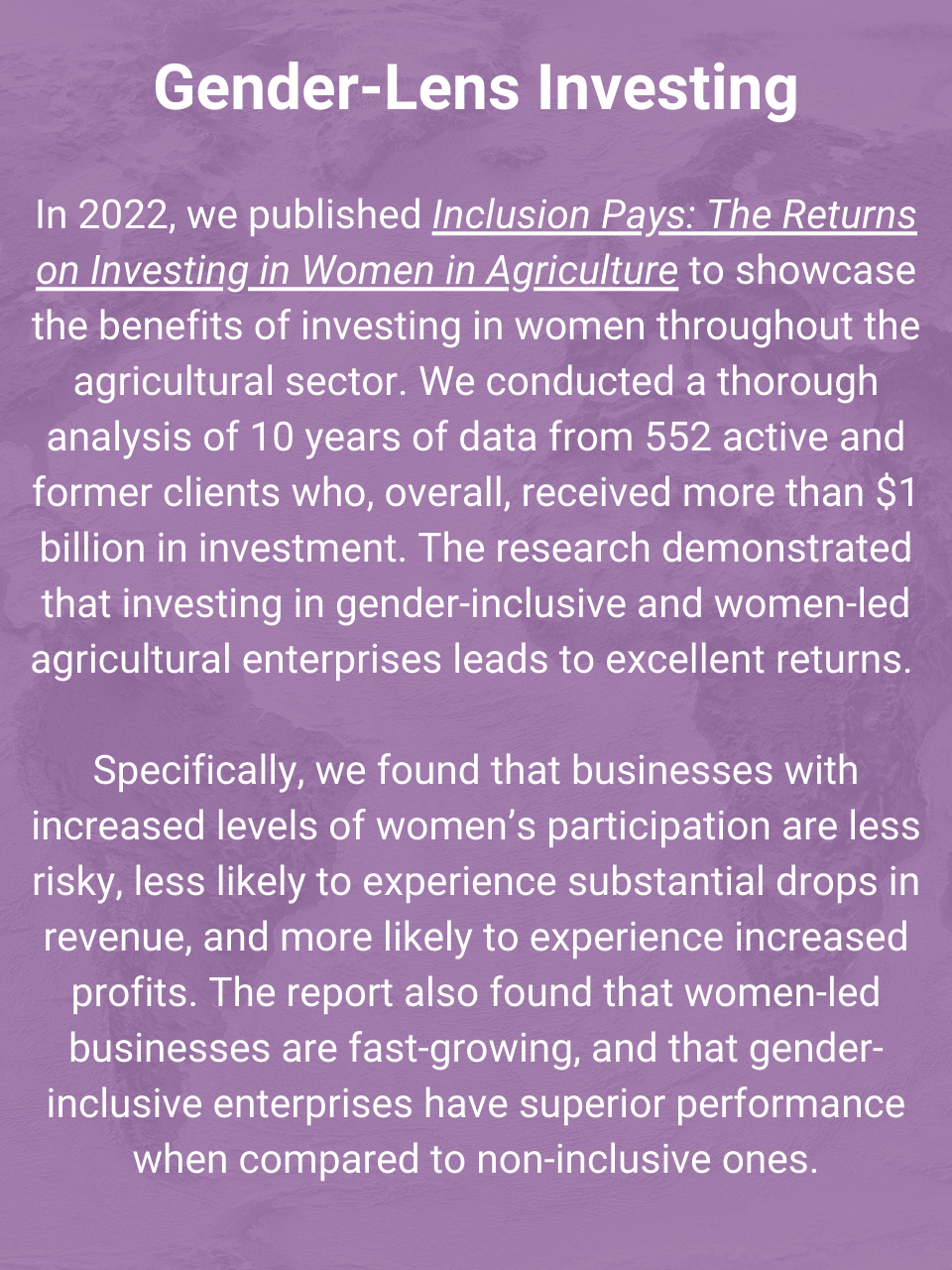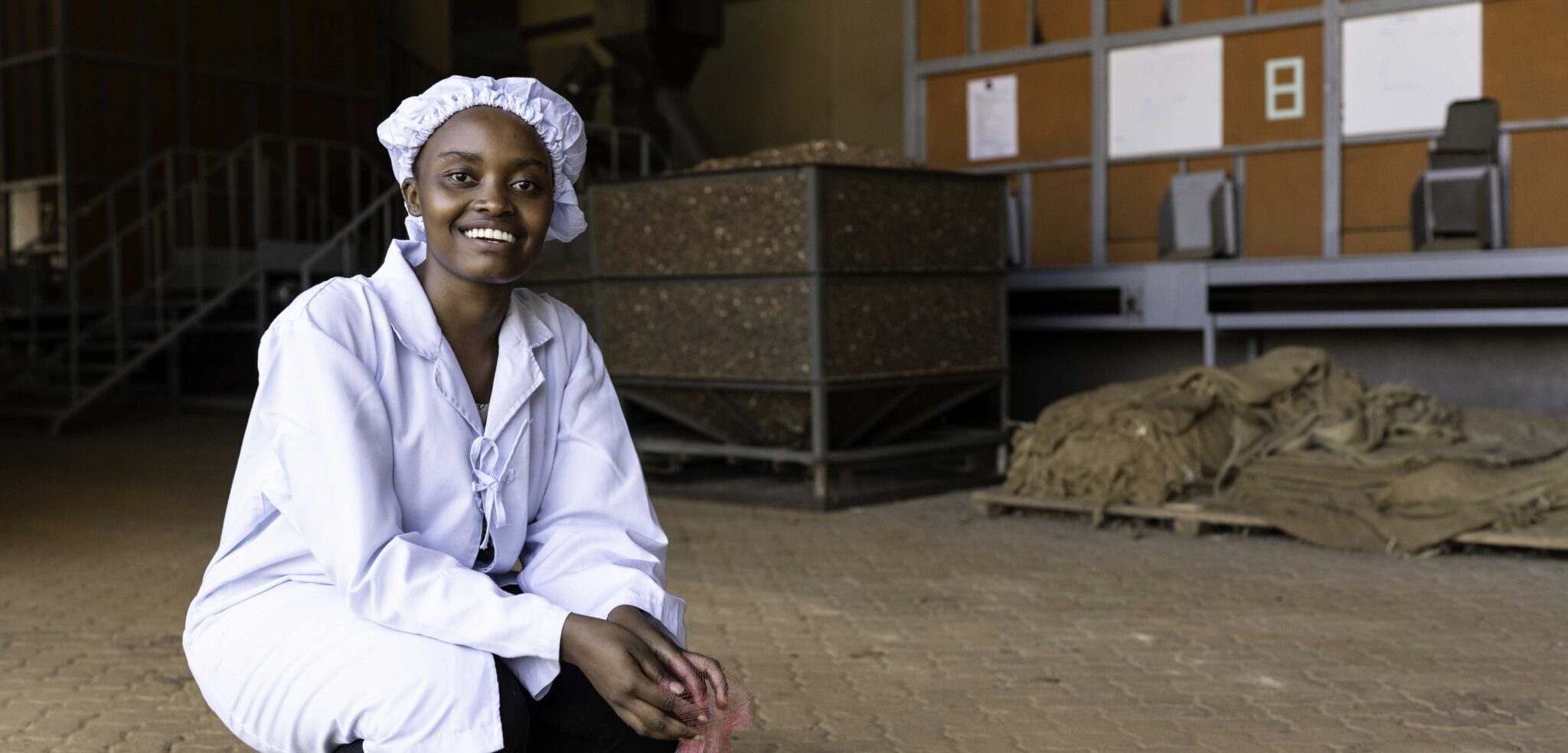
Women in Agriculture Annual Report October 2024
According to the UN Food and Agriculture Organization (FAO), the agriculture sector is a major employer of women globally–with women constituting over 50% of the agricultural labor force in many countries–making them critical to the production of both food and cash crops, and to the health of rural economies overall. Yet despite their essential contributions, women continue to face a lack of access to resources, technical education, and economic opportunities, limiting their economic, social and political participation, which in turn impacts the global economy’s performance in general.
Without equitable access to land, finance, and education—and more specifically, inputs (such as seeds and equipment), services, and digital technologies–women will continue to struggle with gaining access to the benefits of being part of an agricultural enterprise, whether as employees, leaders, or farmers. This inequity within our clients’ value chains is well documented. Women’s roles tend to be marginalized, and their working conditions are likely to be worse than men’s: irregular, informal, part-time, low-skilled, and labor-intensive. This gender disparity becomes more pronounced as extreme weather events continue to break records, significantly reducing rural women’s ability to respond to climate shocks.
Launched in 2012, the Women in Agriculture Initiative (WAI) was created to close gender gaps in agriculture and help women access the resources they need to sustain their livelihoods. For over a decade, Root Capital has invested $700 million in gender-inclusive and women-led enterprises, reaching more than 600,000 women employees and farmers globally. We have also worked to increase women’s access to inputs, training, and technology by increasing the number of women who participate in our capacity-building services, including our climate-related trainings. Currently, 41% of WAI’s advisory training participants are women, marking a significant and steady increase compared to previous years.
As we continue to drive this work forward, the importance of uplifting women in agriculture is clearer than ever.
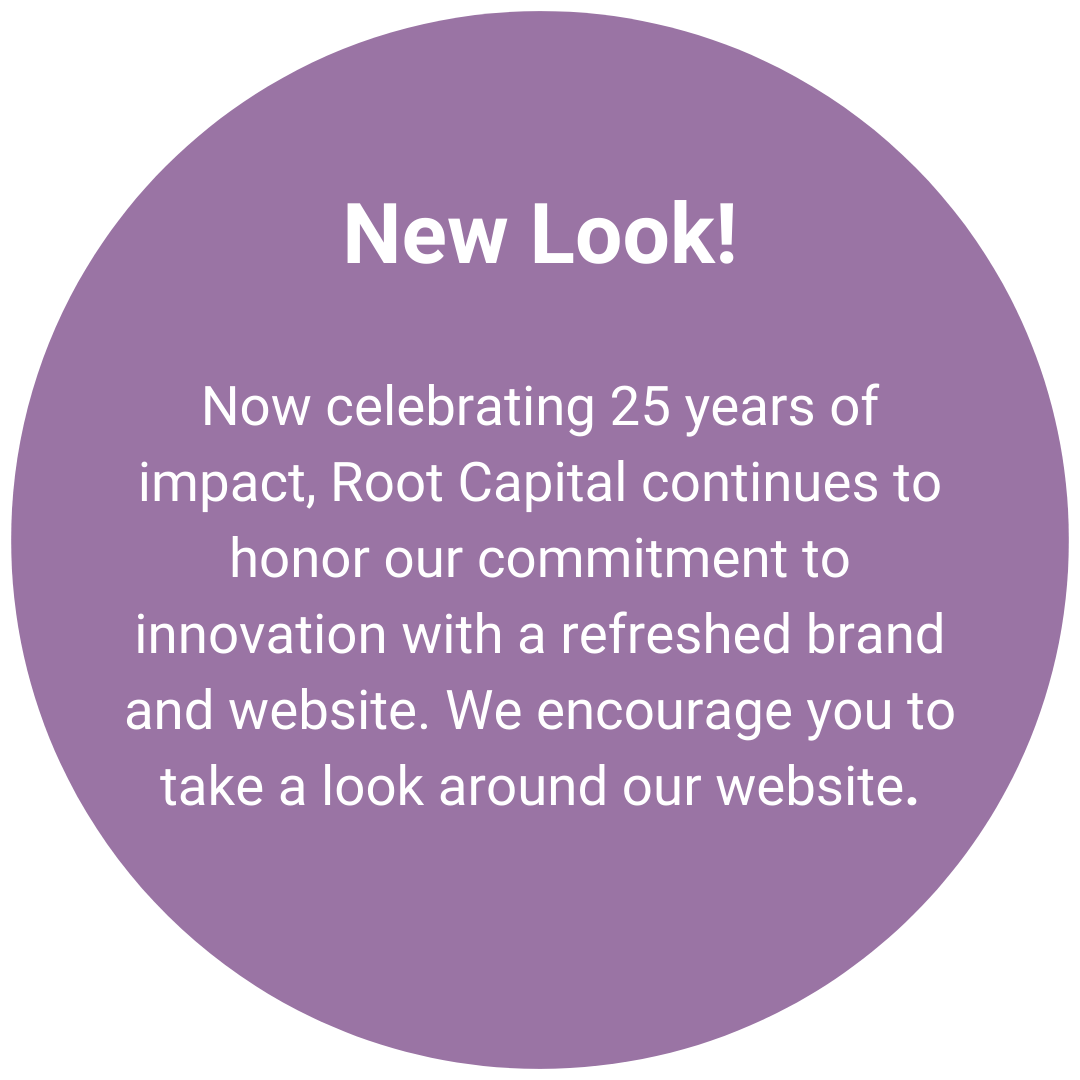
Since launching 12 years ago, WAI has achieved considerable progress in advancing gender equity in agriculture in the Global South. Just in the past 18 months, WAI provided financing to 159 women-led or gender-inclusive enterprises and disbursed over $125 million in business capital. Meanwhile the number of clients reached by Gender Equity Advisory services expanded by 329%. Between October 2023 and September 2024, 95 clients received GEA services. Our GEA advisors reached all lending regions and covered 12 countries, with Peru accounting for 24 clients. These services range from conducting gender gap diagnostics to developing and signing gender action plans.
We established three Women’s Councils with representatives from nearly every country where we operate. Additionally, early results from our Savings and Credit Cooperative Organization (SACCO) program are promising: SACCO women members saved $120 more per year compared to non-SACCO members.
Strategic Plan 2021–2025: Gender Equity
Tracking our progress
In 2021, Root Capital launched our five-year strategic plan to highlight our ambitious goals of building the bankability (access to finance) and resilience of agricultural enterprises. The WAI is a central pillar of this plan and focuses on deepening gender equity and inclusion through four key strategies: Grow, Cultivate, Innovate, and Amplify.
This report shares key highlights from 2023 and the first half of 2024 across these four strategies and charts our progress toward our 2025 goals.
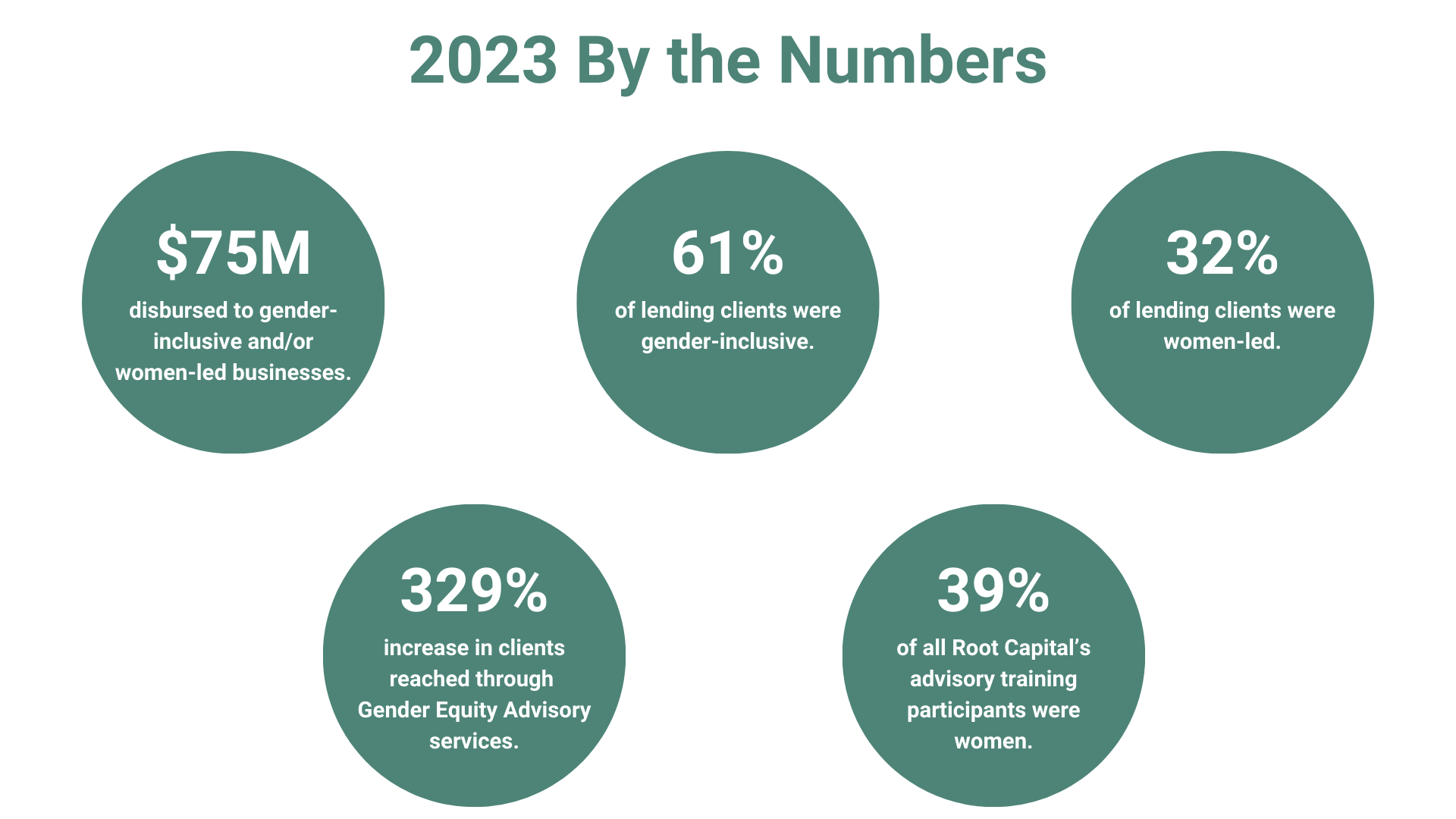
GROW
Increase the proportion of gender-inclusive and women-led businesses in our lending portfolio.
According to the International Finance Corporation, women-led agricultural enterprises face an estimated credit gap of up to $1.7 trillion, even though the rate of non-performing loans among female borrowers is 53% lower than male borrowers. Root Capital’s findings are inline with this information and show that gender-inclusive and women-led businesses continue to be underfinanced, even though they are associated with less risk, increased profits, and faster growth. Women-owned businesses still today account for 33% of the global small and medium agricultural enterprises finance gap, with 65% either financially unserved or underserved.
Our Grow strategy aims to direct more capital to businesses led by women or committed to gender inclusion, which we know are more likely to succeed. It can also help improve the livelihoods, climate resilience, and food security of their families and extended communities. Building relationships with new gender-inclusive and women-led businesses allows us to increase our portfolio, address the most pressing financing gaps, and support the economic advancement of women across the Global South.
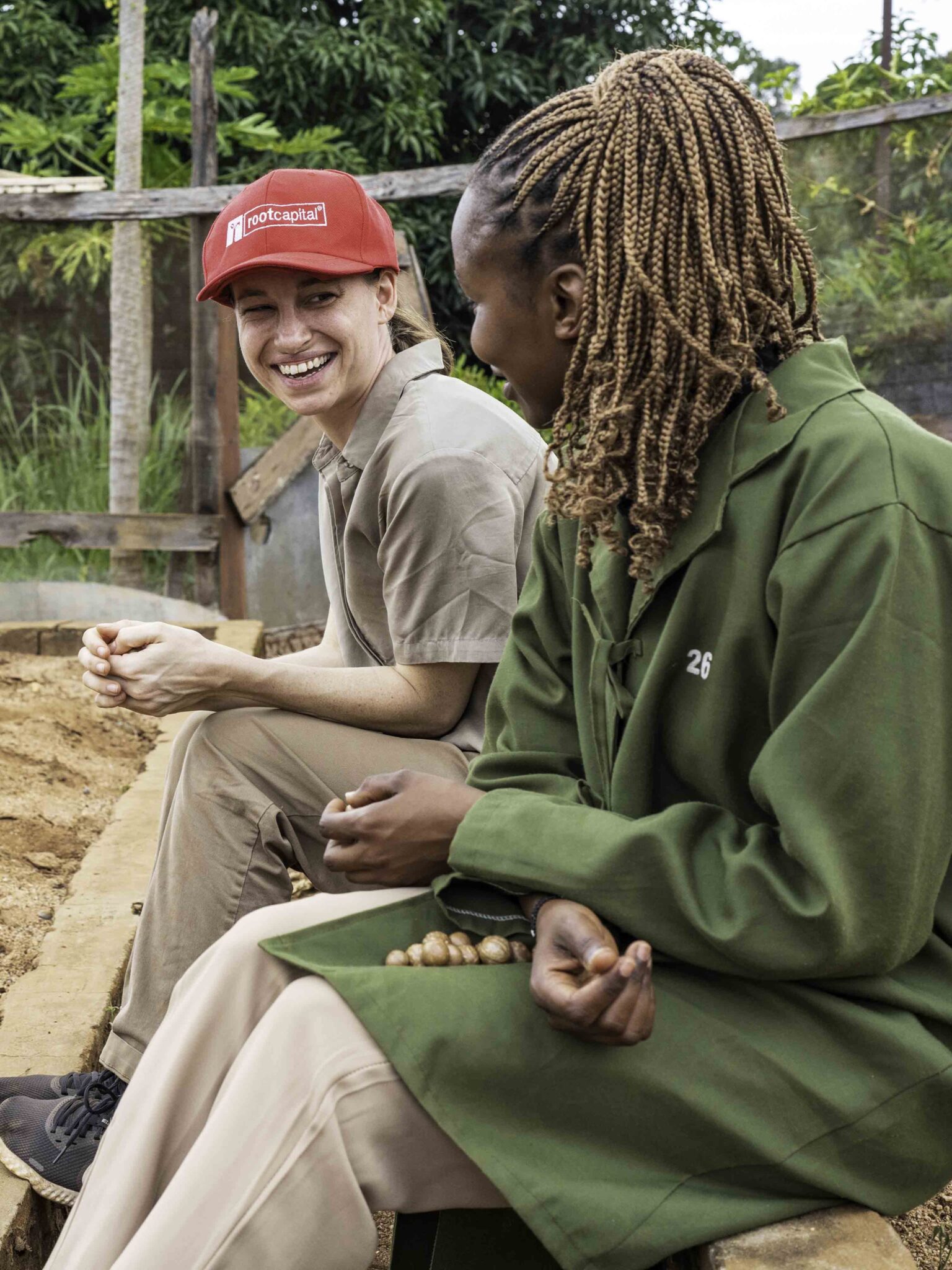
A Root Capital team member chats with Purity, a Root Capital-funded intern at Jumbo Nuts in Kenya. Credit: Adam Finch/Root Capital
In 2023, Root Capital financed 129 gender-inclusive and 69 women-led enterprises, disbursing more than $75 million in urgently needed investment. In the first two quarters of 2024, we financed an additional 116 gender-inclusive and 60 women-led businesses, disbursing more than $50 million. As of mid-2024, the representation of gender-inclusive agricultural enterprises grew from 61% to 64% in our global portfolio, compared to 2023; while women-led enterprises grew from 32% to 34.5%.
These results have exceeded our expectations to ensure that at least 50% of our borrowers are gender-inclusive and 25% are women-led by 2026, yet enterprises often need support beyond financing to achieve gender equity goals.
CULTIVATE
Strengthen the capacity of women working in agricultural enterprises.
In addition to access to credit, Root Capital provides comprehensive services designed to respond to our clients’ evolving needs. Our current advisory services include business management, climate resilience, digital integration, youth inclusion, and more. In 2021, we launched the Gender Equity Advisory (GEA) service, which helps agricultural enterprises diagnose barriers to women’s equitable participation. In addition, the GEA allows enterprises to identify opportunities for gender-inclusive growth and development in partnership with Root Capital staff.
Initially, Root Capital staff conduct a diagnostic with participating enterprises and co-develop GEA training workplans based on clients’ specific needs and gender gaps. Training topics include: the prevention of gender-based harassment and violence, support for women-led entrepreneurship, and masculinities training to help men in leadership roles examine and unlearn patriarchal behaviors. These trainings prompt each enterprise to draft a Gender Action Plan that is relevant to their local context and is capable of accelerating gender inclusion at an enterprise and farm level. Gender Action Plans help businesses integrate gender equity into their overarching strategies and policies, support leadership opportunities for women farmers and employees, and strengthen rural women’s entrepreneurship endeavors.
In 2023, Root Capital provided 353 days of GEA training to 73 businesses, a 329% increase from 2022. In the first half of 2024, we provided 75 clients with GEA services, a 56% increase from the same time the previous year. Additionally, 25 clients developed new or improved gender inclusion policies enterprise-wide in 2023, and seven more developed these policies in the first half of 2024. While this is only a subset of the total number of clients receiving GEA services, it is important to note that it takes time post-training for businesses to develop new policies, especially as they navigate the realities of the market.
Encouragingly, across all Root Capital capacity-building programs, women’s participation in advisory sessions reached 39% in 2023 and 41% in the first half of 2024. This demonstrates a steady uptick since 2022, and highlights that agricultural businesses are continuing to embrace the relevance and power of gender equity.
Women’s Councils
Root Capital’s newly launched Women’s Councils initiative provides a platform for women leaders to explore key issues, such as climate change, access to finance, and gender barriers for women farmers and employees. These councils allow the space for women entrepreneurs to share experiences from a gender-inclusive perspective, co-create innovative solutions to shared challenges, and build strategic plans for women’s empowerment. The program is created for women leaders to learn from each other, while ensuring that Root Capital is also able to adapt our GEA services and WAI strategies to meet specific needs.
Launched in 2023, the first Women’s Council in Nairobi, Kenya, brought together five leaders of diverse businesses in Root Capital’s Africa portfolio. The women had a dynamic discussion in which they vehemently rejected the idea that agriculture is “men’s work” and recognized women as economic powerhouses in agriculture. Building on the success of this convening, Root Capital then organized a second Women’s Council in August 2024 in San José, Costa Rica. The meeting included seven successful women from Costa Rica, Honduras, Mexico, and Nicaragua, who focused on how to enhance women’s leadership in agriculture across the region.
Participants at the event shared their experiences as women agricultural leaders in Latin America, and like their African counterparts in 2023, highlighted the importance of trusting women’s abilities in the agricultural sector and making their leadership and innovation skills in a male-dominated field more visible. Next, participants reflected on their businesses successes, as well as the challenges women face, both at an enterprise and farm level.
On day two of the event, participants identified and mapped several opportunities for women in agriculture and identified Root Capital’s role in partnering on solutions. Notably, participants discussed the intersection of climate resilience and gender equity, the impact of the climate crisis on agriculture and food security, and highlighted the need to focus on intersectionality going forward.
Finally, Root Capital organized a third Women’s Council convening with five leaders from Peru and Colombia, held in September 2024 in Lima, Peru. Plans are underway to bring all three Women’s Councils together for a virtual convening in the coming months to compare and contrast experiences across different regions.
INNOVATE
Support agricultural enterprises to design and implement strategies that benefit women.
To accelerate the implementation of gender action, Root Capital offers select agricultural enterprise Gender Equity Grants (GEGs). Women took advantage of these grants for a variety of purposes, including to train women in specialized areas like the use of machinery, to develop targeted financial products, and to establish plant nurseries to help women farmers diversify their income sources outside of the harvest season. In 2023, we provided 14 GEGs to 14 businesses, disbursing $108,500 in total—this amounts to an average of $7,750 per GEG. In the first half of 2024, Root Capital approved nine additional GEGs to nine agricultural enterprises, disbursing $67,500.
Increasingly, our clients are focusing on climate resilience. Unión de Cooperativas Agropecuarias de Crédito y Servicios Unidas de Mancotal (UCASUMAN) in Nicaragua used their grant to promote climate adaptation practices, such as organic coffee renovation, among women farmers. Simultaneously, they aim to update their internal credit system to ensure it is gender-inclusive and able to support women to effectively launch climate-resilient solutions now and into the future. UCASUMAN noted that this type of training has already made the role of women and their contributions to the farm—and to the organizational structure of the cooperative overall—more visible.
SACCO Pilot
In 2021, Root Capital launched the Savings and Credit Cooperative Organization (SACCO) as a pilot project to address the finance gap for women in agriculture in innovative ways. The project supported the establishment of six SACCOs with macadamia nut clients in Kenya to help them finance their members on an individual basis. Throughout the first two years of the pilot, Root Capital provided valuable support to get each SACCO up and running. Unfortunately, one client left the pilot program due to financial hardship, but the remaining five SACCOs were able to service 628 active members, more than half of whom were women. Collectively, members saved more than $150,000 and disbursed more than $110,000 in loans.
To further understand the project’s impact, especially on women, Root Capital conducted 440 surveys and five focus group discussions in 2023, gathering insights from SACCO leadership and members and non-SACCO members alike. Key findings showed that women SACCO members saved $120 more per year than non-SACCO members, and took out loans that were, on average, $296 larger than non-members. Women SACCO members were also 36.5% more likely to obtain loans compared to non-members, and they tended to save more money for medium and long-term goals. The most common use of loans was payment for school fees and investment in starting new businesses, with women being more inclined than men to leverage their SACCO loans to start new businesses. While findings to date suggest that SACCO leadership roles are still more likely to go to men, 62.7% of their members expressed high or very high satisfaction with the pilot program.
This year, Root Capital onboarded four more clients from Rwanda and Uganda into the program, and we expect to continue offering technical support to the five Kenyan SACCOs until 2026. Further evaluations are planned to better understand the impact of the program over time.
AMPLIFY
Demonstrate to others how to holistically impact women across agricultural value chains
Inspiring a greater focus on gender-lens investing and capacity-building is part of our broader WAI agenda. In 2023, Root Capital earned five media placements focused on our gender equity work, and we spoke at five in-person or online partner events. In the first half of 2024, we earned five additional media placements and two additional speaking engagements.
Among these thought leadership opportunities, two stand out as especially relevant. First, Leonor (Leo) Gutiérrez Fernández, the Director of WAI, joined the Business Fights Poverty podcast to talk about the importance of investing in women farmers. Leo summarized the challenges faced by women in agriculture, such as a lack of land tenure and disproportionate household and family responsibilities. She also noted that climate change, political instability, war, poverty, and family migration further exacerbate these challenges. To create responsive solutions, she highlighted the relevance of not only providing financial, legal, and educational support, but also of creating the right conditions for success. This includes ensuring that rural women have the agency to design their own support mechanisms and that political reforms align with women’s empowerment in the agricultural sector and beyond.
Second, the World Economic Forum published an article by Root Capital that provided key insights about how to invest in women entrepreneurship to achieve long-term impact. The article “4 Ways Investors Can Help Women Entrepreneurs Thrive by Adopting a Gender Lens Approach,” shared a roadmap that included: making a bold and public commitment to foster accountability and information sharing; working to uncover or create opportunities to invest in gender-inclusive or women-led businesses; developing products that are attractive and responsive to women; and working to increase gender equity internally. Throughout the article, we provided examples of how Root Capital has applied each of these four strategies in our partnership work with women, highlighting the returns of this approach.
The Solutions Storytelling Project
The Solutions Storytelling Project (SSP) is a Skoll Foundation-supported initiative of the Video Consortium that connects local filmmakers and changemakers in the Global South. The goal of the SSP is to produce short documentaries that highlight locally-led solutions and inspire positive change. Root Capital is grateful to have been selected alongside AMPROCAL, a women-led coffee cooperative in Honduras that has benefited from our investment, training, and grants, to be part of a SSP documentary. The documentary will be available later this year. Read more about AMPROCAL below.

Impact Story: Yeny Yamilet Salazar and Karen Rocivel Baca of AMPROCAL
A Root Capital client since 2018
Returning Home to Make a Difference
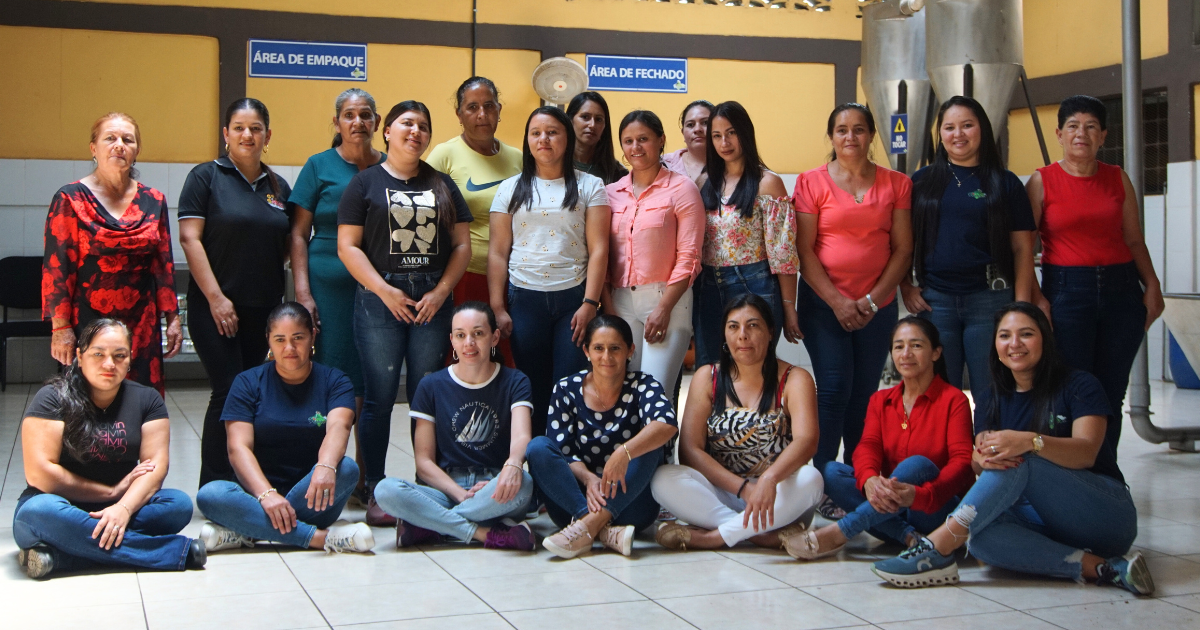
Yeny Yamilet Salazar Brenes and Karen Rocivel Baca Regalado, both from Pashapa La Labor, in the department of Ocotepeque, Honduras, initially sought to build urban careers. Over time, however, the opportunity to build a sustainable livelihood from coffee in their rural community inspired them to return home. With six other women, they founded Asociación de Mujeres Procesadoras de Café La Labor (AMPROCAL) in 2007 to promote women’s participation in agriculture and the local economy. This women-led coffee cooperative met with success and is now supporting 178 women farmers in a male-dominated industry. Their growth, however, has not come without its challenges.
Increasing Alternative Business Opportunities for Rural Women
Despite having achieved organic and fairtrade certifications—which earn a premium in sustainable coffee production—market access for AMPROCAL remains limited and coffee prices are constantly in flux. As a result, like many other producer cooperatives, AMPROCAL has focused on providing their members with opportunities to build alternative sources of income, such as through intercrops like bananas. In 2014, they also established a microfinance program that allows their members to access loans for alternative businesses, to secure more land, or to establish formal land ownership. Formal land tenure is incredibly important in Honduras, especially for women. Without it, long-term financing opportunities are restricted. Land tenure also secures a path for the next generation of women farmers.
Investing in Climate Resilience and Food Security
Financing for rural business and entrepreneurship has never been more critical, especially as agricultural enterprises and smallholder farmers alike attempt to address climate change. AMPROCAL has seen the effects of rising temperatures first-hand, such as variable rainfall, unpredictable harvesting times, and increases in crop diseases, all of which threaten their members’ livelihoods.
In 2020, Root Capital provided AMPROCAL with a grant to support women’s efforts toward climate change adaptation and to help them increase coffee yields through banana intercrop production, improved practices, and the use of organic fertilizer.
When the grant was disbursed in 2020, AMPROCAL was facing not only a changing climate but also a changing world due to the impacts of the COVID-19 pandemic. In response, the cooperative redirected a portion of the grant funding to support 150 women farmers to establish local organic family food gardens alongside new banana trees, a vital activity at a time when traveling to purchase food was especially challenging. Thanks to Root Capital’s flexible support, AMPROCAL was able to help their members improve their incomes from coffee and intercrops at a dire time and support their long-term food security plan.
Sharing a Message of Determination
Yeny and Karen’s story reflects the strength and determination of women leaders everywhere. Today, AMPROCAL is the only coffee association in the region made up and led by 100% women producers. Their continued efforts to navigate cultural and structural barriers, while creating new pathways to financial independence for the women in their community, are exemplary.
Progress Toward 2025 Goals
Cumulative Through Q2 2024
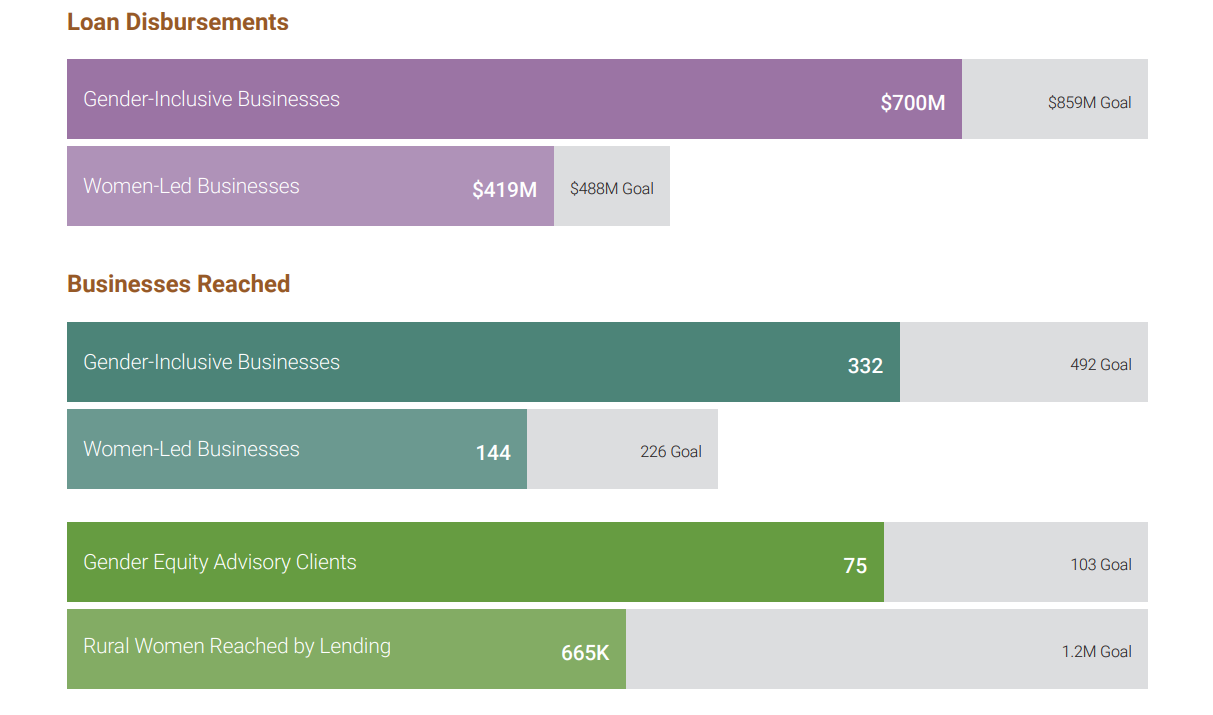
This work is made possible by Root Capital’s dedicated philanthropic and investor WAI partners. With special thanks to:
Ansara Family Fund at the Boston Foundation
Legacy Collective
Pilot House Philanthropy
Visa Foundation
Wagner Foundation
Walmart Foundation
Launched in 2012, Root Capital’s Women in Agriculture Initiative supports agricultural enterprises to generate opportunities that are inclusive of women throughout their value chains. To learn more and to support this work, visit rootcapital.org or email giving@rootcapital.org.
Click here to download a PDF of this report.
1. Lauren Phillips and Benjamin Davis, comps. The Status of Women in Agrifood Systems. Inclusive Rural Transformation and Gender Equality Division, Food and Agriculture Organization of the United Nations, 2023. https://openknowledge.fao.org/server/api/core/bitstreams/e7689bf7-00f0-465b-ad03-e0c56ffb14b1/content.
2. Gender-inclusive businesses, as defined by Root Capital, mean that women make up more than 30% of its farmers and employees, or that the enterprise is women-led and women make up more than 20% of farmers and employees.
3. Aleksandra Liaplina and Kruskaia Sierra-Escalante. Closing the Gender Finance Gap Through the Use of Blended Finance. International Finance Corporation, World Bank Group, 2022. https://www.ifc.org/content/dam/ifc/doc/2023-delta/closing-the-gender-finance-gap-through-blended-finance.pdf.

